In his speech to the Russian nation on Monday, President Vladimir V. Putin buoyed his case for codifying the cleavage of two rebel territories from Ukraine by arguing that the very idea of Ukrainian statehood was a fiction, The New York Times reports:
With a conviction of an authoritarian unburdened by historical nuance, Mr. Putin declared Ukraine an invention of the Bolshevik revolutionary leader, Vladimir Lenin, who he said had mistakenly endowed Ukraine with a sense of statehood by allowing it autonomy within the newly created Soviet state. …. As a misreading of history, it was extreme even by the standards of Mr. Putin, a former K.G.B. officer who has declared the Soviet Union’s collapse the greatest geopolitical catastrophe of the 20th century.
“Modern Ukraine was entirely and fully created by Russia, more specifically the Bolshevik, communist Russia,” Putin claimed. “This process began practically immediately after the 1917 revolution, and moreover Lenin and his associates did it in the sloppiest way in relation to Russia — by dividing, tearing from her pieces of her own historical territory.”
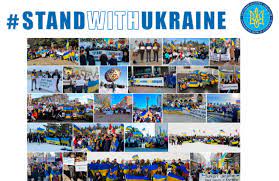 What happens in the coming hours will decide how bad the Ukraine crisis gets for the vulnerable democracy in Putin’s sights but also its potentially huge impact on Americans and an already deeply unstable world, CNN reports:
What happens in the coming hours will decide how bad the Ukraine crisis gets for the vulnerable democracy in Putin’s sights but also its potentially huge impact on Americans and an already deeply unstable world, CNN reports:
Whether Putin stages a full-scale invasion into all of Ukraine or limits his incursion to sending troops to two pro-Moscow regions in the east that he recognized as independent on Monday will dictate the severity of sanctions the US and its allies say will be the most consequential ever imposed on Moscow.
“This is Potemkin politics,” a senior administration official told reporters. “President Putin is accelerating the very conflict that he’s created.”
On Sunday, a handful of activists unfurled antiwar posters in central Moscow’s Pushkin Square and were promptly arrested, The Times adds. One of the protesters, Lev Ponomarev, a Soviet-era human-rights activist, insisted that while for the moment many still could not imagine a war, most Russians would oppose it if it actually happened.
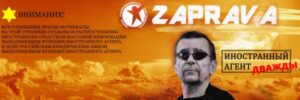 “There will be no support for this war,” Mr. Ponomarev (right) said in an interview on Monday. “It will be the collapse of this regime.”
“There will be no support for this war,” Mr. Ponomarev (right) said in an interview on Monday. “It will be the collapse of this regime.”
Other Russians are refusing to buy into Putin’s narrative or, in the case of some senior government officials, demonstrably uncomfortable in doing so.
“Hundreds and soon, tens of thousands of Ukrainians and Russian citizens may die because of Putin,” Aleksei A. Navalny, the imprisoned opposition leader, posted on social media. “Sure, he won’t let Ukraine develop and will drag it into a swamp, but Russia will pay the same price.”
Many of Putin’s team give the impression of genuinely believing the propaganda narrative Russia has built to justify its continuing aggression against Ukraine, The Guardian’s Luke Walker reports. Not everyone was so enthusiastic: the prime minister, Mikhail Mishustin, spoke briefly and drily, looking visibly uncomfortable. Not willing to let him off the hook without swearing fealty to the decision that was already inevitably on the way, Putin asked him directly whether he supported it; Mishustin mumbled that he did.
An unprovoked full-scale invasion of a democratic neighbor would mark “the end of the post-cold war and the beginning of something dramatically and tragically different, the end of our hopes and illusions,” said Gerard Araud, former French Ambassador to the U.S., on Twitter.
‘Ukraine will fight alone’
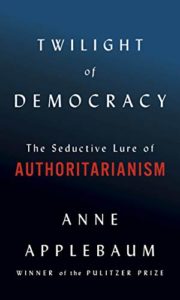 For several centuries, Ukraine has thought of itself as a nation opposed to the Russian nobility and empire, Anne Applebaum tells MSNBC (above). There was a short-lived independent republic during the Bolshevik Revolution, but its main threat to Putin is its example as a model of democracy that refutes his claim that autocracy is the only model for Russia. The Biden administration has been “brilliant” in responding to the crisis, she adds.
For several centuries, Ukraine has thought of itself as a nation opposed to the Russian nobility and empire, Anne Applebaum tells MSNBC (above). There was a short-lived independent republic during the Bolshevik Revolution, but its main threat to Putin is its example as a model of democracy that refutes his claim that autocracy is the only model for Russia. The Biden administration has been “brilliant” in responding to the crisis, she adds.
Putin’s narrative is indeed “a fiction. Ukraine has its own thousand-year history,” adds AP vice president John Daniszewski. “What is now Ukraine was a contested region of shifting borders for centuries that did not come completely under Moscow’s rule until late in the 18th century during the reign of Catherine the Great, and even then the Russian Empire was never able to swallow it easily or completely.”
There are no Chamberlains in this story, but no Churchills either, she writes for The Atlantic. Despite everything that was said [at the Munich Security Conference], everything that was promised, and everything that was discussed, Ukraine will fight alone.
If Putin goes on to attack the rest of Ukraine, as his posture of force suggests he will, the costs of the resultant war for the west will be much higher than those of wide-ranging sanctions or providing military support to Ukraine, and Europe will be destabilized for decades, adds former British diplomat Ian Bond, the director of foreign policy at the Centre for European Reform. If he is to be deterred from going farther, even at this late stage, the west needs to make him uncertain that the gain will be worth the pain. Everything must be on the table, he writes for The Guardian.
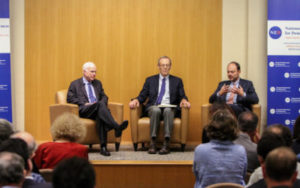
Vladimir Kara Murza (far right) with NED’s Carl Gershman (center) and Senator John McCain
Russian rulers do not have a good track record of “small victorious wars” launched for domestic political purposes — from the czarist regime’s disastrous campaigns in Crimea and Japan in the 19th and early 20th centuries to the invasion of Afghanistan in the waning years of the Soviet Union. The result is usually the opposite of what was intended, Vladimir Kara-Murza writes for The Washington Post:
“For Russia, such wars end not only unsuccessfully, but often in a political catastrophe,” warned Professor Andrei Zubov, an eminent historian who was fired from Russia’s top diplomatic academy in 2014 over his opposition to the annexation of Crimea. “We know what public attitudes were after the defeat in the Russo-Japanese war of 1905 [leading to Russia’s first revolution]. We could have the same now. We could face a situation when people won’t accept this gamble by the regime.”
“This is like a big shakedown operation. We’re going to come in, and we’re going to scare everybody half to death. And then we’re going to see what we can get from that,” says Mitchell A. Orenstein, a professor of Russian and Eastern European studies at the University of Pennsylvania. Putin sees how Ukraine operates as a country and it could be making him nervous.
“If Ukraine can do it, Russia can do it. If Ukraine can be a democracy, Russia can be a democracy. And therefore, what is the future for Putin and his dictatorial regime?” Orenstein said.
 Putin demonstrates tactical skill, but strategic miscalculation, says Daniel Fried, the Weiser family distinguished fellow at the Council and a former US ambassador to Poland.
Putin demonstrates tactical skill, but strategic miscalculation, says Daniel Fried, the Weiser family distinguished fellow at the Council and a former US ambassador to Poland.
Putin has alienated Ukrainians, undermined residual German support for endless understanding of Russia, and, if he does launch a full-on invasion, risks triggering opposition in Russia itself, he writes. Forty years ago, the Kremlin had regained control over Poland when its communist leaders declared martial law. Now, Putin is struggling to regain power over Ukraine. The future may not belong to Putin as much as he supposes, adds Fried, a board member of the National Endowment for Democracy (NED).
‘The West has been looking for fascism anywhere, but not where it was most,” @MariaTomak, an activist supporting people from Crimea, tells the @nytimes. “ Maybe this will finally make the West start to sober up about Russia.” #ukrainerussia https://t.co/Tfhff6fQlc
— Democracy Digest (@demdigest) February 22, 2022
“It is hatred for all of Ukraine and revenge for the country’s movement toward the E.U. and NATO and democracy — albeit chaotic, with huge problems, slow reforms and corruption — but where people elect and change power in elections or revolutions,” said Kristina Berdynskykh, a prominent political journalist. “The worst dream for an old lunatic is both scenarios: fair elections and revolutions.”
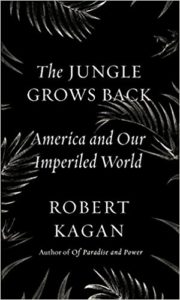 But it is time to start imagining a world where Russia effectively controls much of Eastern Europe and China controls much of East Asia and the Western Pacific, argues Robert Kagan, a senior fellow at the Brookings Institution. Americans and their democratic allies in Europe and Asia will have to decide, again, whether that world is tolerable, he writes for The Washington Post.
But it is time to start imagining a world where Russia effectively controls much of Eastern Europe and China controls much of East Asia and the Western Pacific, argues Robert Kagan, a senior fellow at the Brookings Institution. Americans and their democratic allies in Europe and Asia will have to decide, again, whether that world is tolerable, he writes for The Washington Post.
The US is unmasking Russian hackers faster than ever, Patrick Howell O’Neill writes for MIT Technology Review. “It creates a credibility gap, particularly with the Russians and Chinese,” says Gavin Wilde, formerly a senior National Security Council official focused on Russia. “They can obfuscate all they want, but the US government is putting it all out there for public consumption—a forensic accounting of their time and efforts.”
As Russian Defense Minister Sergei Shoigu said in a video published in January, “There is an information war on all fronts, and we have no right to lose this war.” This dynamic explains Moscow’s broader confrontation with the U.S. and Europe, its burgeoning relationship with China, and its goal in Ukraine: disrupting Ukrainian democracy, notes analyst Ben Sohl.
Moscow’s political and security elites see democratic political movements inside Russia and around the world not as the logical consequence of repressive political systems but rather as the result of Western states using information warfare to promote liberal values, he writes for New Lines.
It was Western democracy promotion Putin was referring to when he said, “Cultural self-awareness, spiritual and moral values, and value codes are an area of fierce competition. Sometimes, it is subject to overt informational hostility … and well-orchestrated propaganda attacks,” Sohl adds.
Revisionist manifesto
A joint statement from Russia and China challenged conventional definitions of democracy and human rights, prompting scathing criticism that the two authoritarian regimes are trying to redefine universal concepts to suit their agenda.
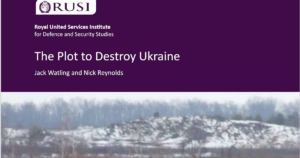 “It’s an act of defiance,” EU foreign policy chief Josep Borrell told the Munich Security Conference. “It’s a clear revisionist manifesto.”
“It’s an act of defiance,” EU foreign policy chief Josep Borrell told the Munich Security Conference. “It’s a clear revisionist manifesto.”
By implicitly siding with Moscow on the Ukraine crisis, Beijing gains “considerable diplomatic leverage” and “presumes that Russia will act likewise when China finds itself in a critical security situation”, Richard Ghiasy, an expert at the Hague Centre for Strategic Studies, told AFP.
The two countries have a history of military and political conflict. Yet, they have drawn closer together and developed an unusually close partnership, analysts suggest.
“There’s no real trust between Russia and China,” said Jakub Jakubowski, a senior fellow at the Center for Eastern Studies, a Polish state think tank, so it’s a friendship of convenience.
“This constant fear of being overthrown by a democratic revolution is something that really binds them. And the end of the day, that’s to the very deepest fundament there is for this relationship, as it’s not only a state-to-state strategic alignment but also an alliance of two authoritarian regimes that stand back to back,” says Jakubowski.
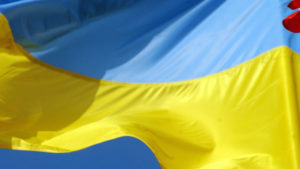
Council of Europe
But other analysts suspect trade and financial factors take precedence over support for Russian belligerence which could threaten major investment deal Beijing is trying to seal with the EU.
“The Ukraine crisis… carries significant risk of the bottom falling out of (China’s) relationships with the EU and the US,” Bill Bishop wrote in the Sinocism China Newsletter. “I do not believe that Xi and his team want to see Russia invade Ukraine, as they understand the risks from the expected reaction to any invasion.”
A senior Biden administration official concedes that intelligence is just a “series of reports and inputs” that can offer a “picture” but “almost never a perfect smoking gun”. Yet overall it showed a “remarkable consistency” about Putin’s plans, helping to push US allies and partners towards a more muscular stance that they hope has put the Russian leader off kilter and maybe even changed his calculations, the official tells The Financial Times.
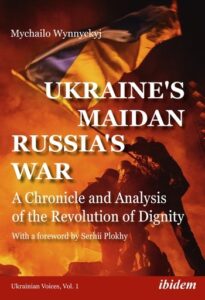 “If one of Putin’s objectives was to divide the transatlantic alliance, or to create confusion . . . that has already demonstrably failed,” the administration official says, adding: “We would love nothing more than to be wrong about all of this. We can’t let the hope that we’re wrong about this block us or hinder us from telling the truth about what it is we are seeing”.
“If one of Putin’s objectives was to divide the transatlantic alliance, or to create confusion . . . that has already demonstrably failed,” the administration official says, adding: “We would love nothing more than to be wrong about all of this. We can’t let the hope that we’re wrong about this block us or hinder us from telling the truth about what it is we are seeing”.
“Undoubtedly the regular public release of intelligence is working as a massive deterrent,” adds Mychailo Wynnyckyj, a professor at Kyiv-Mohyla Business School in Kyiv and the author of the book Ukraine’s Maidan, Russia’s War. “Putin has been completely deprived of any element of surprise.”
Putin sees the world through the lens of deception and provocation – maskirovka and provokatsiia, notes Yale University’s Timothy Snyder. He follows a tradition and ideology in which Soviet organs were superior to their Western counterparts, he writes for The Atlantic:
In the early 1920s, when the Soviet state was vulnerable to outside pressure, the Cheka ran an operation called “Trust.” Its operatives went abroad to pose as members of a conspiratorial organization inside the U.S.S.R. They told European intelligence services that they could bring down the Soviet regime, and just needed money. This discouraged European states from intervening in the Soviet Union at a time when intervention would have made a difference, and secured hard currency to supplement the Cheka’s budget.
If Putin sought to divide the transatlantic alliance, he has ‘demonstrably failed,’ a US administration official tells @FT https://t.co/mvjPykC1fF
— Democracy Digest (@demdigest) February 19, 2022
Does the U.S. strategy have a chance to affect Putin’s decision-making? and ask in The New Yorker. One can imagine it cutting two ways. Mikhail Podolyak, an adviser to the Ukrainian President, Volodymyr Zelensky, said that the Zelensky administration is wary of the possibility of war taking on an air of inevitability, they report:
“You can imagine the Russians thinking, Well, seeing as everyone considers it predetermined, we might as well do it.” But the opposite may also be possible. By making such categorical predictions, Biden and other officials could have created an opening for Putin to paint the absence of a major 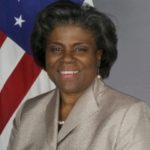 invasion as further proof of American hyperbole and unreliability.
invasion as further proof of American hyperbole and unreliability.
“If we’re wrong, then that’s good,” said Linda Thomas-Greenfield (right), the U.S. Ambassador to the U.N. At the very least, the U.S. has shown a new willingness to try and outflank Putin’s attempts at disinformation.
In his 2007 address to the Munich Security Conference, Putin firmly rejected the post-Cold War system he’s still trying to torpedo and made clear that the U.S.-led liberal order, a.k.a. the Free World, was of no interest or value to Russia, the Atlantic Council’s Fried and Kurt Volker, a distinguished fellow at the Center for European Policy Analysis observe.
We must regard Putin’s Russia as an authoritarian adversary while simultaneously reaching out to Russian society. Above all, we must understand what Putin has been openly telling us, they write for POLITICO:
Putin didn’t just tame the oligarchs of the 1990s; he replaced them with his own. He was creating something resembling a Soviet system of Communist Party control, just without the Soviet ideology and a personal structure of rule in place of the old Party nomenklatura.







